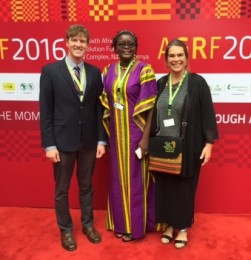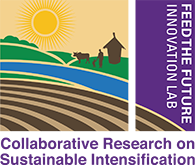
Nairobi, Kenya -The Feed the Future Sustainable Intensification Innovation Lab (SIIL), through the invitation from the African Union Commission (AUC), has joined the Research and Extension Technical Network and the Knowledge Management, Policy Analysis and Accountability for Results Technical Network which will steer the African Union-led Comprehensive African Agriculture and Development Programme (CAADP). CAADP was reaffirmed in 2014 by African Union Heads of State and Government through the Malabo Declaration which laid out an ambitious set of goals to achieve accelerated agricultural growth and transformation for shared prosperity and improved livelihoods in Africa. In order to guide these goals, seven thematic technical networks consisting of leading organizations working across Africa have been organized.
The Research and Extension Technical Network was established to provide training and technical advice in agricultural research and extension to government entities on policies, priority interventions and good practices that can accelerate achievement of national, regional and continent agriculture production, productivity and food security goals related to Malabo and CAADP.
The Knowledge Management, Policy Analysis and Accountability for Results Technical Network is designed to channel best practices in relevant agricultural development areas as it relates to measuring, monitoring and evaluating progress. This network will share strategic planning processes, agriculture statistics and data management resources, and support knowledge generation and dissemination. The intent of this technical network is to build countrywide capacity to strengthen policy analysis and develop mutual accountability and knowledge management systems.
Dr. Vara Prasad, Director of SIIL, Dr. Jan Middendorf, Associate Director, and Dr. Zach Stewart, Research Associate, will serve as the key advisers between SIIL and these CAADP technical networks.
One of the fundamental pillars of the U.S. government’s Feed the Future program is to align Innovation Lab research agendas with country-led priorities. The linkage between CAADP and SIIL is a critical partnership to ensure the alignment of SIIL’s current and future efforts with the objectives of the African Union and African organizations pursuing similar activities. Alignment of SIIL activities with country-led priorities is critical to the sustainability and long-term transfer of new Feed the Future innovations to farmers and end users. Without focus on country-led priorities and partnership with established African institutions, the successful delivery of new innovations after project end is often limited.
CAADP is an unparalleled initiative for agricultural transformation that raises the political profile of agricultural investments in Africa. Through the Malabo Declaration, 80% of African countries have agreed to allocate at least 10% of public expenditures to agriculture and improve policy practices with the goal of 6% annual growth across the agricultural sector. CAADP is not a “one size fits all” agenda but rather a framework for promoting evidence-based policy planning and implementation by strengthening joint sector reviews, dialogue, and mutual accountability platforms and by prompting alignment and coordination of development by African countries.
CAADP represents the choice of African governments to prioritize agriculture-led growth and poverty reduction. Its core principles include African ownership and leadership, inclusivity, evidence based planning and mutual accountability.
The key commitments of the Malabo Declaration are:
- A recommitment to enhance investment in agriculture with the goal of each African country to investing at least 10% of their annual public expenditure on agriculture
- A commitment to end hunger by 2025
- At least a doubling of productivity by 2025 through improved access to inputs, irrigation and mechanization
- Reduction of stunting to 10% by 2025
- Commitment to halve poverty by 2025 through inclusive agricultural growth and transformation
- Commitment to boosting intra-African trade in agricultural commodities and services
- Commitment to enhance resilience in livelihoods and production systems to climate variability and other shocks
- Commitment to mutual accountability to actions and results
Approximately 80 percent of African countries have adopted these CAADP principles, targets, and processes.


